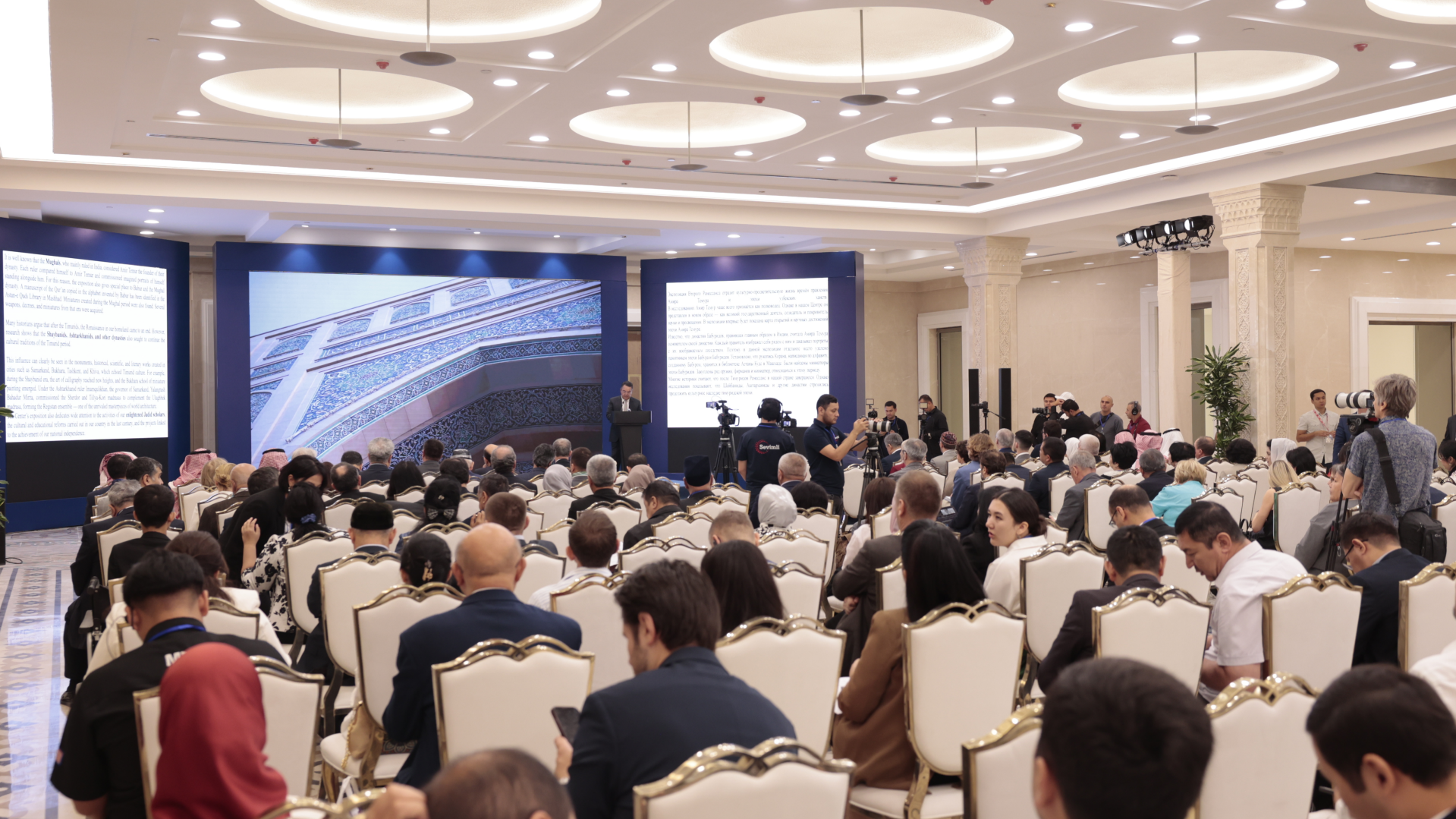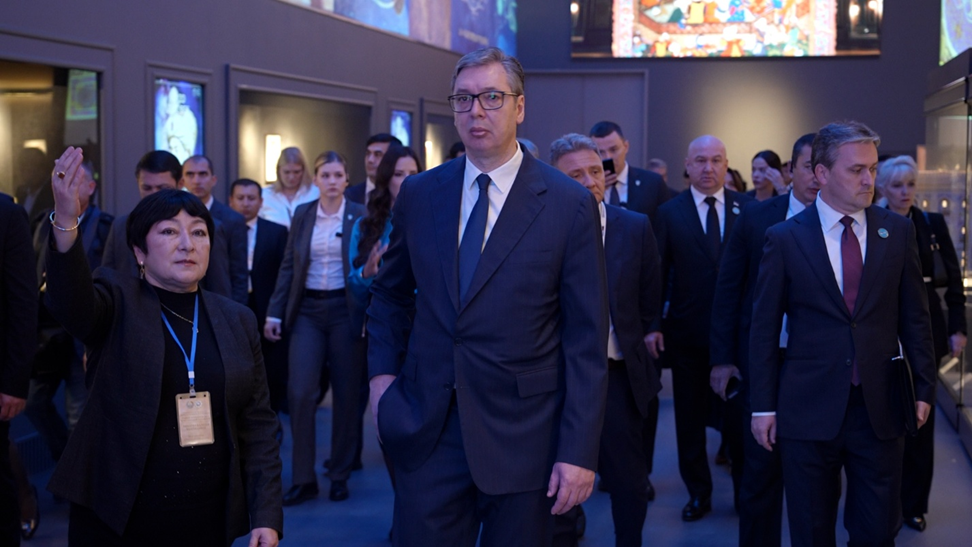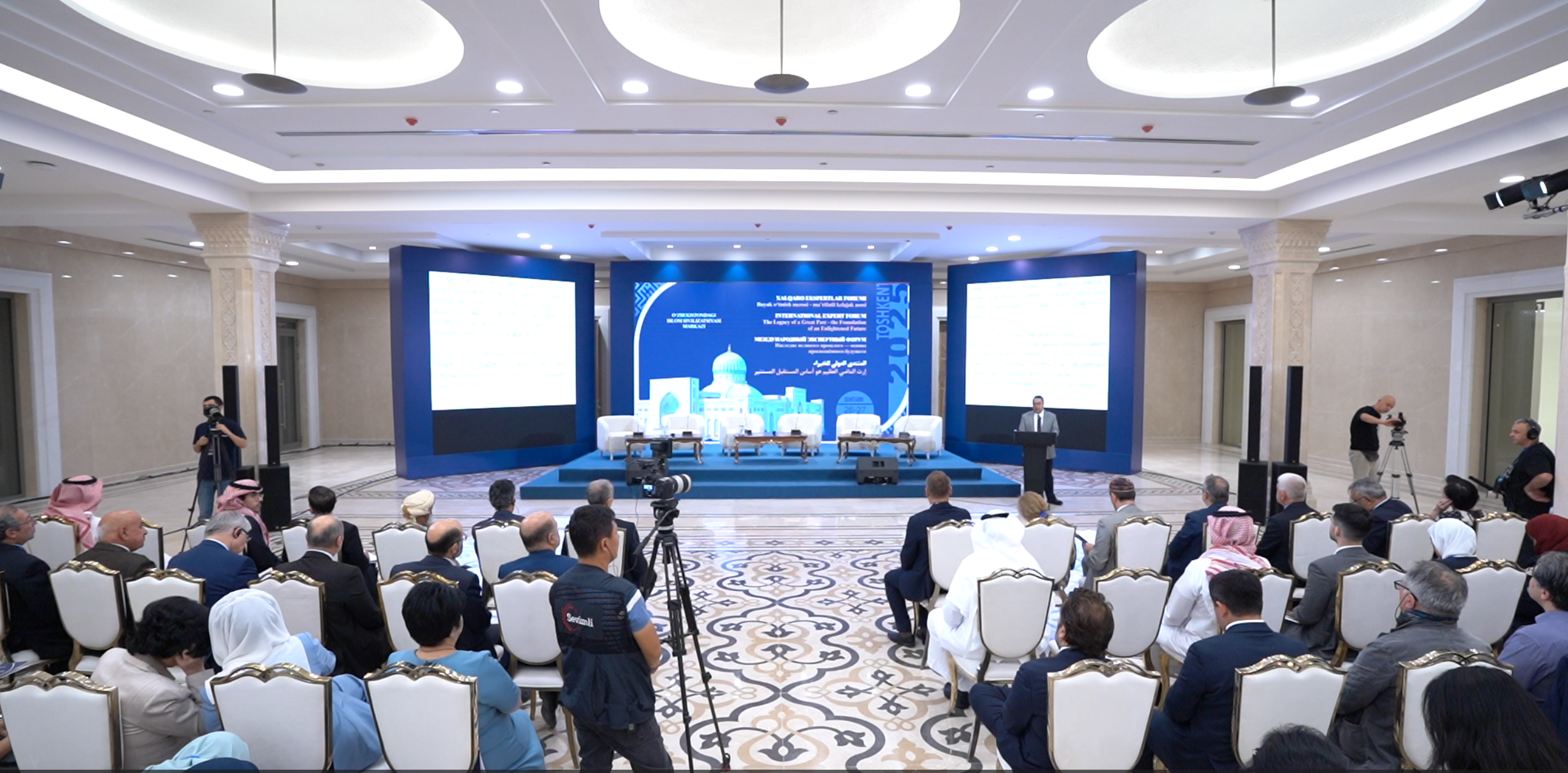The International Week of Cultural Heritage provided all of us with valuable and vibrant moments
Firdavs Abdukhalikov: "The International Week of Cultural Heritage provided all of us with valuable and vibrant moments."
The International Week of Cultural Heritage in Tashkent was held under the theme "The Phenomenon of the Eastern Renaissance: States, Religions, Personalities, and Civilizations." What are the results of this unique project?
The Director of the Center of Islamic Civilization, Chairman of the World Society for the Study, Preservation, and Promotion of Uzbekistan's Cultural Heritage (WOSCU), and Honored Journalist of the Republic of Uzbekistan, Firdavs Abdukhalikov, shared insights on this mega project:
-
As you are aware, under the initiative of our esteemed President Shavkat Mirziyoyev, significant attention is being given to science, education, and culture in Uzbekistan, as well as to the study and popularization of our cultural heritage.
Seven years ago, from the podium of the United Nations, the head of state emphasized that one of the most important tasks was to convey the true humanistic essence of Islam to the world community. On June 23, 2017, the President's decree "On Measures to Organize the Center of Islamic Civilization in Uzbekistan under the Cabinet of Ministers of the Republic of Uzbekistan" was adopted.
A large-scale effort began to create the Center of Islamic Civilization.
In June 2018, the President personally laid the first symbolic stone in the foundation of the Center and noted that the goal of its construction is to study Islamic enlightenment and convey to our people and the global community the legacy of our great ancestors. The President has visited the Center several times, familiarizing himself with the project and progress of construction.
Approximately ten decrees, resolutions, and other regulatory acts have been adopted to improve the activities of the Center.
Undoubtedly, significant work has been done over the past seven years. However, today, for the implementation of this mega project, the experience and consultations of scholars, specialists, and experts from both local and international levels are crucial.
During a meeting with the President in June of this year, the importance of wide cooperation with domestic and foreign scholars, prominent experts, and international experts was emphasized, and specific instructions were given.
Therefore, on July 3-4 of this year, we organized the first national forum of Uzbek scholars. Around 500 orientalists, historians, and art historians participated. The conference discussed the goals and objectives of the Center of Islamic Civilization, plans, and projects to be implemented in cooperation with other countries. Over two days, participants presented their reports and projects, as well as expressed more than 600 proposals and comments. As a result of the forum, an expanded scientific council of leading scholars was approved. The proposal to organize a major international conference aimed at enriching the Center's activities by involving foreign experts was unanimously supported.
From August 23-26, the 8th International Congress of the World Society for the Study, Preservation, and Promotion of Uzbekistan's Cultural Heritage was held in Tashkent and Samarkand under the theme "The Great Legacy of Ancestors – The Foundation of the Third Renaissance." Over 350 scholars and experts from nearly 40 countries participated in the congress. The congress was entirely dedicated to enriching the content and determining the directions for the future activities of the Center, as well as the development of joint projects.
It is particularly noteworthy that the esteemed President sent a congratulatory message to the participants of the congress. In his message, the President called all the scholars and specialists true friends of Uzbekistan and highly praised their scientific and creative activities. In turn, the congress participants expressed their gratitude to the President for the attention given to the project and expressed their willingness to actively participate in the creation of the Center. As a result of the congress, the Samarkand Declaration was adopted.
We propose to use the project called "Time Capsule" as an immersive show, demonstrating the transitions of the Renaissance era from one block to another. In this project, we are assisted by the Russian studio "Sila Sveta" under the leadership of Alexander Usa, as well as the creative team of the Turkish company "Outdoor Factory" under the leadership of Sinan Turaman.
Of course, we plan to effectively use modern information technologies and artificial intelligence to implement this mega project. During the recent BRICS Global Summit in Kazan, President Shavkat Mirziyoyev met with Herman Gref, President of Sberbank of Russia, and expressed satisfaction with the opening of the second campus of the educational institution School 21 in Tashkent. This institution specializes in training highly qualified specialists in digital technologies.
Oleg Kapitonov, head of the international department at Sberbank, also participated in our events. We plan to collaborate with them, including in the improvement and automation of the translation of scientific texts into world languages using artificial intelligence capabilities.
As is well known, the Center pays special attention to cooperation with international organizations such as UNESCO, ISESCO, and IRCICA. The goal is to attract local and foreign experts, conduct scientific research, provide extensive information on the development of science, culture, art, and architecture during the Muslim Renaissance, and organize effective interreligious and intercivilizational dialogue. Therefore, the second floor of our Center is dedicated to offices and representations of international organizations and researchers, which expands cooperation opportunities with both local and foreign experts.
Over the past seven years, the Center has accumulated a significant collection of manuscripts and artifacts. Notably, the unique library of rare manuscripts and books donated to the Center by Alisher Usmanov, for which we express our special gratitude, is a major asset.
At the same time, we continue to acquire items and manuscripts related to our cultural heritage at global auctions. However, we also approach various national museums and institutions, requesting that they share with us their historical collections that remain unused in their storage. We need to undertake enormous work to create copies of artifacts and manuscripts housed in various collections worldwide. For this purpose, we have established cooperation with the company "Müller and Schiller," which specializes in producing high-quality facsimile editions. We are working together with Alexander Wilhelm, the Vice President of "Müller and Schiller," on the publication of 100 unique facsimiles of manuscripts related to Uzbekistan.
We are grateful to Igor Malkiel, head of the scientific laboratory at the State Hermitage Museum in Russia, who has extensive experience in creating replicas of exhibits that are virtually indistinguishable from the originals.
But the main content of our Center, of course, consists of the results of research conducted by both domestic and foreign scholars over the years. We extend our readiness to collaborate with them. All our exhibitions are focused on key themes related to great civilizations, eras, discoveries, and, of course, historical figures who have made significant contributions to the development of humanity and our country.
For example, the well-known Japanese scholar and numismatics expert Dr. Sergey Laptev is implementing a project to enrich the Center's numismatic collections. During the Week, Sergey Valeryanovich gave interesting presentations.
Professor Mahmudo Yazıcı from Pamukkale University talked about the manuscript "Sahih Bukhari" by Imam Bukhari, which is 825 years old and is kept at their institution.
The famous German Orientalist Aysima Mirsulton reported the discovery of unique albums created during the Baburid era, written in the Turkic language. These findings demonstrate their loyalty to their culture, history, and native language, despite centuries spent far from their homeland. We have decided to jointly publish a facsimile of this unique edition.
Miljana Radivojević, a researcher at the British Institute of Archaeology, and her team are implementing a research project on the history of metallurgy along the Great Silk Road and in Akhsikent.
Nihora Dvurechenskaya, a researcher at the Institute of Russian History of the Russian Academy of Sciences, presented a project on the restoration of the archaeological site of Uzundara in Surkhandarya. Irina Arzhantseva from the Institute of Ethnography and Archaeology of Russia presented research on the ancient civilization of Khwarezm.
Professor Badriddin Mahsudov from Tajik National University presented a research project on one of the first manuscripts about the life of Amir Timur in the Turkic language.
The event also featured Mahmud Erol Kılıç, Director of IRCICA, who proposed the initiative to create an encyclopedia of scholars from the land of Uzbekistan. Under the leadership of TURKSOY's Secretary General Sultan Raev, a project is being planned to create a digital platform for Turkic-speaking countries. We have reached an agreement with Joshkun Yılmaz, Head of the Manuscript Department of Turkey, on providing digital copies of manuscripts related to the history of Uzbekistan. Bakhit Rumeisi, Chairman of the "Manara" Center from the United Arab Emirates, invited 10 of our staff members for internships as guides.
Media projects are also of great importance to us. During the presentation of the "Living History" program, developed under the initiative of President Shavkat Mirziyoyev, film projects were presented, telling the stories of our great ancestors and history. This work is being carried out by the Agency for Cinematography of Uzbekistan, and we are ready to participate in this important project.
We have established cooperation with many international film studios and TV channels. In particular, we are working with "TRT-Avaz" on the media project "The Age of the Turks," with "Russia-Kultura" on a ten-part documentary dedicated to the archaeology of Uzbekistan, and with the "BBC" on a special project dedicated to the Qur'anic manuscripts related to Uzbekistan. We have also reached agreements with CNN and EURONEWS to create and broadcast content about New Uzbekistan and the history of our country.
In total, more than 30 conferences, seminars, forums, exhibitions, and presentations were organized during the International Week of Cultural Heritage. We listened to around 250 reports and original ideas from domestic and foreign scholars studying Uzbekistan's rich cultural heritage, history, and culture. About 20 memoranda of cooperation were signed, and more than 100 joint projects with foreign partners were presented.
Of course, the presented projects are still in progress. To implement them, we need to involve dozens of scholars and specialists and establish cooperation with the relevant institutions and organizations. We are open to any objective proposals and comments.
Certainly, specific projects may spark discussions and disagreements among scholars, but I assure you that the final decision will be made by the scientific council, which we all elected at the National Forum of Scholars of Uzbekistan.
We believe that the International Week of Cultural Heritage provided all of us with valuable and vibrant moments. I would like to take this opportunity to express my gratitude to all the foreign and domestic scholars, representatives of international and foreign organizations who participated in our events, as well as to those whose names I have not mentioned. I also extend my appreciation to the scientific, creative, and technical staff of our Center and everyone who helped organize this Week at such a high level, including media representatives who promptly and objectively covered all the events.
I am confident that the opinions, ideas, and projects expressed will bear fruit in the future. We will unite our forces and capabilities to jointly implement many valuable initiatives.
Prepared by N. Usmanova, UzA
Most read

Over 100 experts from more than 20 countries of the world are in Tashkent!

President of Serbia Aleksandar Vučić visited the Islamic Civilization Center in Uzbekistan

The Center for Islamic Civilization – a global platform leading towards enlightenment











